
By DEVIKA C. MEHTA
CLAREMONT, CA - Culture, history and religion has been an intrinsic element of India and several other South Asian countries. To explore deeply, South Asian Studies Association met on March 25- 26 at Claremont McKenna College and marked their committed resolution for strengthening and expansion in the field.
CLAREMONT, CA - Culture, history and religion has been an intrinsic element of India and several other South Asian countries. To explore deeply, South Asian Studies Association met on March 25- 26 at Claremont McKenna College and marked their committed resolution for strengthening and expansion in the field.
Presented by SASA, the US-based alliance of international university scholars, and hosted by Claremont McKenna College (CMC), the conference featured presenters and participants from institutions across the US and around the globe on the subject ‘South Asian Studies- Never More relevant’.
During the two-day engagement, 60 scholarly presentations within 20 panels and three major plenary sessions focused on South Asia- its rich history, culture, governance, economics, religions, philosophy and arts.
Ken Silverman, Chairman of SASA Board said, “We come from many backgrounds and many parts of the world, but share a single vision and purpose. With the help of this event, we dive deep into South Asia from multiple perspectives.”
Silverman’s thoughts were mutually shared by both Claremont Mayor Sam Pedroza and CMC President Hiram E.Chodosh. Pedroza said that the City of Claremont is a community that celebrates diversity and was founded on the principle of civic engagement. “Our city leaders embrace a community rich and diverse in culture, education and religion. Our rich 130 years history is influenced by the academic energy of colleges and the vitality of our citizenry. Claremont is a multicultural community with strong representation from South Asia.”
Excited to host SASA’s 11th anniversary conference at CMC, Chodosh extended wishes and rooted that South Asia is a strong focus of global liberal arts program. “We at CMC are eager to learn from scholarly invaluable contributions by South Asians.”
One of the organizers of the event, David Blundell of National Chengchi University, Taipei with expertise in Anthropological Linguistics, while speaking to IJ mentioned, “5,000 years of rich, extraordinary history, home to one quarter of the earth’s population and the world’s fastest growing major economy. There has never been a more important time than now to focus upon and assess South Asia and its place in the world.”
Indo-American ties also got a special focus during the event with keynote address from the Consul General of India- San Francisco Ambassador Venkatesan Ashok, who pointed, “We are trying to bring synergy. India has a prestigious name, economy, population, rich heritage and hence invites vast talent from all parts of the world. The government of India is encouraging US investors in business by creating `Make in India’ and `Digital India’ programs. We understand that both the countries are the world’s largest democracies and therefore natural allies.”
Praising Prime Minister of India Narendra Modi for bringing out schemes like Aadhar, he compared it with the US counterpart - Social Security Number (SSN) and called it more successful.
It was also the night of awards with SASA conferring honorees Navin and Pratima Doshi with 2017 Exemplar Award for Community Service. The couple have been longtime passionate supporters of the field of South Asian Studies.
After receiving the award from Silverman, the Doshis talked about the importance of family values and sources of inspiration and asked everybody to share, contribute and give something back to the society.
Taking the stage, Navin Doshi expressed, “As a young boy of nine in Bombay, I shared a walk with Mahatma Gandhi during a visit to Mahabaleshwar with my parents and today I am here. We can learn a lot from South Asian society and this time is more than relevant to understand India and its rich heritage. Today many Americans lack an understanding of our country. Hence, the study of culture and heritage will increase people’s appreciation for the rich history and traditions that shape India today.”
The second honoree, Dr Rafiq Dossani, Professor of Economics and Director of Rand Center for Asia Pacific Policy, presented some very keen facts on how India’s democracy is losing balance. He also talked about his experiences in the US, rural program benefits in India and received the award for Academic Achievement in 2017.
Other than keynote addresses, many panelists also debated several issues ranging from Indian Art, Mahabharata, Sikhism to Uniform Civil Code over the course of two days.
Six films panning a range of culture and social interactions from India to Pakistan and Sri Lanka across time and space from 1934 to 2016 were also shown after the event. Don Farber’s photography display of Tibetan Buddhist Masters featuring the Dharma Heritage Project garnered a lot of attention.
Attendees were treated to some South Asia’s very special cuisine, music and performances by Malaysian and Nepali groups engulfing a warm collegial atmosphere for which SASA conferences are so widely appreciated. LA’s very own Bollywood dancer Monica Sarin also enthralled the crowds with her dance moves.
During the two-day engagement, 60 scholarly presentations within 20 panels and three major plenary sessions focused on South Asia- its rich history, culture, governance, economics, religions, philosophy and arts.
Ken Silverman, Chairman of SASA Board said, “We come from many backgrounds and many parts of the world, but share a single vision and purpose. With the help of this event, we dive deep into South Asia from multiple perspectives.”
Silverman’s thoughts were mutually shared by both Claremont Mayor Sam Pedroza and CMC President Hiram E.Chodosh. Pedroza said that the City of Claremont is a community that celebrates diversity and was founded on the principle of civic engagement. “Our city leaders embrace a community rich and diverse in culture, education and religion. Our rich 130 years history is influenced by the academic energy of colleges and the vitality of our citizenry. Claremont is a multicultural community with strong representation from South Asia.”
Excited to host SASA’s 11th anniversary conference at CMC, Chodosh extended wishes and rooted that South Asia is a strong focus of global liberal arts program. “We at CMC are eager to learn from scholarly invaluable contributions by South Asians.”
One of the organizers of the event, David Blundell of National Chengchi University, Taipei with expertise in Anthropological Linguistics, while speaking to IJ mentioned, “5,000 years of rich, extraordinary history, home to one quarter of the earth’s population and the world’s fastest growing major economy. There has never been a more important time than now to focus upon and assess South Asia and its place in the world.”
Indo-American ties also got a special focus during the event with keynote address from the Consul General of India- San Francisco Ambassador Venkatesan Ashok, who pointed, “We are trying to bring synergy. India has a prestigious name, economy, population, rich heritage and hence invites vast talent from all parts of the world. The government of India is encouraging US investors in business by creating `Make in India’ and `Digital India’ programs. We understand that both the countries are the world’s largest democracies and therefore natural allies.”
Praising Prime Minister of India Narendra Modi for bringing out schemes like Aadhar, he compared it with the US counterpart - Social Security Number (SSN) and called it more successful.
It was also the night of awards with SASA conferring honorees Navin and Pratima Doshi with 2017 Exemplar Award for Community Service. The couple have been longtime passionate supporters of the field of South Asian Studies.
After receiving the award from Silverman, the Doshis talked about the importance of family values and sources of inspiration and asked everybody to share, contribute and give something back to the society.
Taking the stage, Navin Doshi expressed, “As a young boy of nine in Bombay, I shared a walk with Mahatma Gandhi during a visit to Mahabaleshwar with my parents and today I am here. We can learn a lot from South Asian society and this time is more than relevant to understand India and its rich heritage. Today many Americans lack an understanding of our country. Hence, the study of culture and heritage will increase people’s appreciation for the rich history and traditions that shape India today.”
The second honoree, Dr Rafiq Dossani, Professor of Economics and Director of Rand Center for Asia Pacific Policy, presented some very keen facts on how India’s democracy is losing balance. He also talked about his experiences in the US, rural program benefits in India and received the award for Academic Achievement in 2017.
Other than keynote addresses, many panelists also debated several issues ranging from Indian Art, Mahabharata, Sikhism to Uniform Civil Code over the course of two days.
Six films panning a range of culture and social interactions from India to Pakistan and Sri Lanka across time and space from 1934 to 2016 were also shown after the event. Don Farber’s photography display of Tibetan Buddhist Masters featuring the Dharma Heritage Project garnered a lot of attention.
Attendees were treated to some South Asia’s very special cuisine, music and performances by Malaysian and Nepali groups engulfing a warm collegial atmosphere for which SASA conferences are so widely appreciated. LA’s very own Bollywood dancer Monica Sarin also enthralled the crowds with her dance moves.

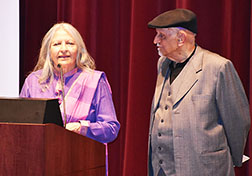
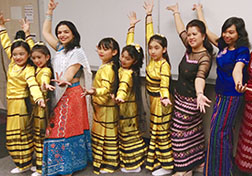
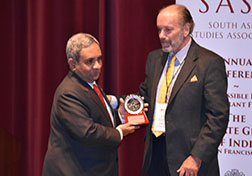
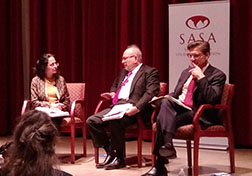
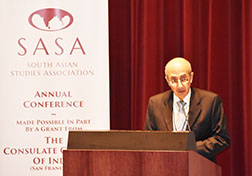
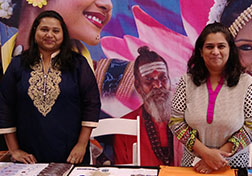
 RSS Feed
RSS Feed
